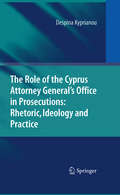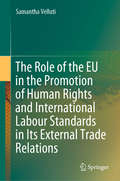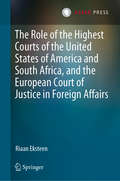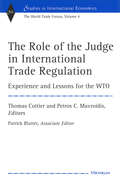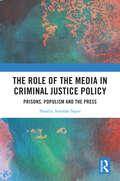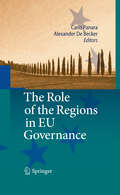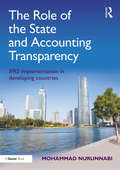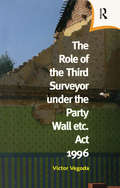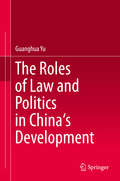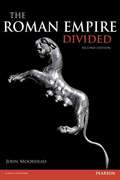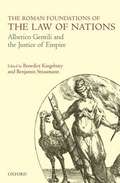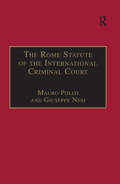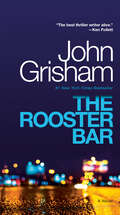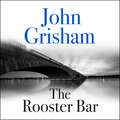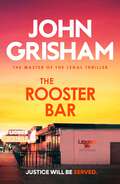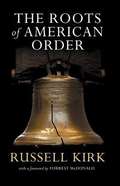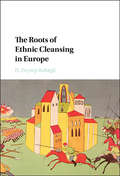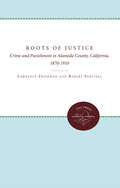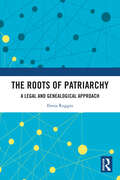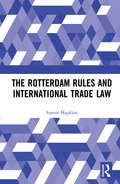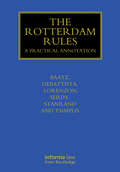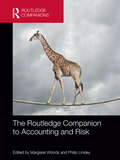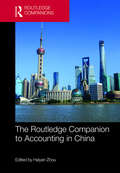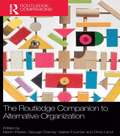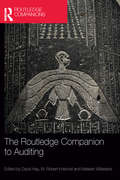- Table View
- List View
The Role of the Cyprus Attorney General's Office in Prosecutions: Rhetoric, Ideology and Practice
by Despina KyprianouThis book is a fascinating and entirely original work about the role of the Cyprus Attorney General's Office in prosecutions. It is based on data gathered using an impressive blend of methods, including observation, a documentary survey and semi-structured interviews within the Office. The book focuses mainly on the workload of the Law Office and its relationship with the Police, the role it acquires during investigations and its role in the formulation and application of prosecution policies. These themes are approached from three different angles: the legal framework and the rhetoric developed over time concerning these areas, combined with the manner in which successive Attorney Generals have approached their role; the ideology that characterises the Law Officers' position towards these particular functions, and the actual day-to-day activity (practices) observed within the Law Office. Although the central purpose of this work is to provide a profound understanding of the Cyprus system, wider conclusions can be drawn which exceed the boundaries of the particular jurisdiction and shed light on the most debatable aspects of the prosecution process in all jurisdictions.
The Role of the EU in the Promotion of Human Rights and International Labour Standards in Its External Trade Relations
by Samantha VellutiThis book represents a significant and timely contribution to the copious literature of the EU as a global actor providing new insights and fresh perspectives into the promotion of human rights and international labour standards in the EU’s external trade relations, building on and stimulating further – the already well-engaged – scientific dialogue on this area of research. In particular, it provides the basis for developing a new analytical structure for better understanding the role of the EU in promoting human rights and international labour standards in global trade and, in particular, for assessing the extent to which and how normative considerations have influenced the adoption of EU legal instruments and policy decisions. This book will appeal to research scholars, post-graduate students, practitioners and human rights activists.
The Role of the Highest Courts of the United States of America and South Africa, and the European Court of Justice in Foreign Affairs
by Riaan EksteenThis book deals with what the author considers a sorely neglected question, namely the role of the judiciary in states’ foreign policy processes. Eksteen argues that the impact of the judiciary on foreign affairs is understudied and that recognition of its role in foreign affairs is now due. This makes it a ground-breaking scholarly contribution that should first of all prove of value to students, scholars, researchers and practitioners in the two broad fields of politics and law for the wide scope of issues it covers and the very comprehensive reference lists it contains. Secondly, professionals working within politics, including members of the legislatures of the United States, the European Union and South Africa, as well as members of the judiciaries there, should find this book of benefit.A detailed examination has been undertaken of the role of the United States Supreme Court, the two high courts in South Africa, namely the Constitutional Court and the Supreme Court of Appeal, and the European Court of Justice of the European Union, in foreign affairs. The author substantiates the unmistakable fact that these Courts have become involved in and influence foreign affairs. Furthermore, that they have not shied away from using their judicial authority when dealing with cases touching on foreign affairs and especially presidential overreach.The lack of recognition of the judiciary’s role in foreign affairs is still noticeable in Foreign Policy Analysis (FPA) literature. This book concludes that FPA has to accept and give proper recognition to the judiciary and its increasing relevance in foreign affairs.Dr. Riaan Eksteen is a Former South African Ambassador residing in Namibia; from 1968-1973 he served at the South African Embassy in Washington D.C.; between 1976-1994, he subsequently served as Ambassador and Head of Mission at the U.N. in New York (1976-81), in Namibia (1990-91), at the U.N. in Geneva (1992-94), and in Turkey, with accreditation also to Azerbaijan, Kyrgyzstan, Turkmenistan and Uzbekistan (1995-97). He obtained his Ph.D. from the University of Johannesburg in October 2018.
The Role of the Judge in International Trade Regulation: Experience and Lessons for the WTO
by Thomas Cottier Petros Constantinos Mavroidis Patrick BlatterThe WTO is generally seen as a key actor of globalization and, as such, has been the point of convergence of popular irritation worldwide. Many of the reproaches addressed to the WTO show civil societys concern with what is perceived as a democratic deficit in the way the organization operates. The main fear is to see trade rise as the ultimate value, prevailing over concerns such as health and environment. The Role of the Judge offers insight into how disputes are solved at the WTO level, into how the judicial branch interacts with the rest of the organization, and into the degree of sensitivity of the system to external input. The book sheds light on the judicial system governing the WTO and shows it to be the only truly multilateral system where disputes are solved by third-party adjudication. The book develops along three lines: the first a search for cases submitted to the WTO where the judge exceeded its authority; the second a comparison of the WTO with the operations of national judicial systems having different levels of integration, specifically the United States (federal level) and the EC (quasi-federal level); and the third an exploration of directions for the future of dispute settlement in the WTO. Reflecting the diversity of its contributors, this book addresses questions of economics, political science, and law, bringing an unusual level of multidisciplinarity to this topic and context. It is designed for both academic readers and practitioners, who will find it full of practical insights as well as rich and detailed analysis.
The Role of the Media in Criminal Justice Policy: Prisons, Populism and the Press
by Natalia Antolak-SaperThis book provides a socio-legal examination of the media’s influence on the development and implementation of criminal justice policy. This impact is often assumed. And, especially in the wake of high-profile crimes, the press is routinely observed calling for sentences to be harsher, and for governments to be tougher on crime. But how do we know that there is a connection? To answer this question, the book draws on a case study of the media reporting of the rape and murder of Jill Meagher in Melbourne, Australia; as well as other well-known cases, including those of James Bulger, Sarah Payne, Stephen Lawrence and Michael Brown, among others. Deploying a socio-legal framework to examine how the media’s often powerful and emotive narratives play a crucial role in the development and implementation of law, the book provides a deep and critical reflection on its influence. The book concludes with a number of suggestions for media reform: both to moderate the media’s influence, and to incorporate a broader range of viewpoints. This multi-disciplinary book will appeal to scholars and students in sociolegal studies, criminology and criminal law as well as those working in relevant areas in sociology and media studies.
The Role of the Regions in EU Governance
by Carlo Panara Alexander De BeckerThis publication compares for the first time how the regions in seven different countries (Austria, Belgium, France, Germany, Italy, Spain and the UK) are involved in EU governance. It is also the first book which tackles this matter from two different perspectives; that of EU law and that of comparative law. It includes contributions both from well-established scholars in the field of EU law and from younger scholars.
The Role of the State and Accounting Transparency: IFRS Implementation in Developing Countries
by Mohammad NurunnabiDr Mohammad Nurunnabi examines the factors that affect the implementation of International Financial Reporting Standards (IFRS) in developing countries and answers these specific research questions: - What is the relative impact of accounting regulatory frameworks and politico-institutional factors on the implementation of IFRS in developing countries? - How do cultural factors affect said implementation? - How does a study of implementing IFRS help to build an understanding of a theory of the role of the state in accounting change in developing countries? This follows a mixed methodology approach, in which interviews are conducted, IFRS-related enforcement documents and annual reports are evaluated. More than 138 countries have adopted IFRS, yet the International Accounting Standards Board (IASB) does not provide an implementation index. Financial reporting varies by country, even within the area of the world that has apparently adopted IFRS and Nurunnabi offers an important viewpoint that considers the issues of IFRS implementation from various perspectives. This is an invaluable resource for Undergraduate, Masters and PhD students, policy makers (at local, regional and international level) namely the IASB, World Bank, IMF, practitioners and users, giving them the necessary insight into the financial reporting environment and the state’s attitude towards accounting transparency. Most importantly, this book contributes to military and democratic political regimes and the Max Weberian view of the theory of the role of the state’s attitude towards accounting transparency.
The Role of the Third Surveyor under the Party Wall Act 1996
by Victor VegodaThis book is intended to clear any misconceptions about the responsibilities of the third surveyor and outlines the steps taken in choosing a professional for this role, as well as discussing who may carry it out.
The Roles of Law and Politics in China's Development
by Guanghua YuThis book examines China's economic development from the end of 1970s, integrating perspectives from law, economics and political science. Particular attention is given to the role of formal law and political changes in China's development, presenting the argument that formal law has made a useful contribution to China's economic development. Chapters explore the relationship between democracy and mechanisms of property rights protection, financial market, rule of law, and human capital accumulation. The author goes on to examine the persistence of authoritarianism, democracy and economic development and the concept of deliberative democracy. This book concludes with a look at future options for China, from political, economic and rule of law perspectives. The book considers China's current political regime and analyzes the likely political and constitutional law reforms that are not only conducive to China's economic development but also beneficial to the enhancement of freedom. Some knowledge of the Chinese legal system, economy, and political institutions is assumed, making this book valuable to those requiring a deeper understanding of the subject. The book will appeal to legal scholars and lawyers requiring an understanding of the impact of the Chinese legal system on China's economic and political development and to scholars and students in political science and economics with an interest in China's institutional change. Policy makers and administrators with an interest in policy and law making in China will also find this book valuable.
The Roman Empire Divided (Second Edition)
by John MoorheadIn 400 the mighty Roman Empire was almost as large as it had ever been; within three centuries, advances by Germanic peoples in western Europe, Slavs in eastern Europe and Arabs around the eastern and southern shores of the Mediterranean had brought about the loss of most of its territory. Ranging from Britain to Mesopotamia, this book explores the changes that resulted from these movements. It shows the different paths away from the classical past that were taken, and how the relatively unified civilization of the ancient Mediterranean gave place to the very different civilizations that cluster around the sea today. <p><p> This comprehensive and authoritative second edition has been thoroughly revised and updated line-by-line, and contains several new sections dealing for instance with the new evidence provided by recent finds like the Staffordshire Treasure and the widespread effects of the plague. As well as a completely new bibliographical essay, The Roman Empire Divided now also includes six maps and an expanded selection of illustrations fully integrated in the text.
The Roman Foundations of the Law of Nations: Alberico Gentili and the Justice of Empire
by Benedict Kingsbury Benjamin StraumannThe Roman Foundations of the Law of Nations makes the important but surprisingly under-explored argument that modern international law was built on the foundations of Roman law and Roman imperial practice. A pivotal figure in this enterprise was the Italian Protestant Alberico Gentili (1552-1608), the great Oxford Roman law scholar and advocate, whose books and legal opinions on law, war, empire, embassies and maritime issues framed the emerging structure of inter-state relations in terms of legal rights and remedies drawn from Roman law and built on Roman and scholastic theories of just war and imperial justice. The distinguished group of contributors examine the theory and practice of justice and law in Roman imperial wars and administration; Gentili's use of Roman materials; the influence on Gentili of Vitoria and Bodin and his impact on Grotius and Hobbes; and the ideas and influence of Gentili and other major thinkers from the 16th to the 18th centuries on issues such as preventive self-defence, punishment, piracy, Europe's political and mercantile relations with the Ottoman Empire, commerce and trade, European and colonial wars and peace settlements, reason of state, justice, and the relations between natural law and observed practice in providing a normative and operational basis for international relations and what became international law. This book explores how both the theory and the practice of international politics was framed in ways that built on these Roman private law and public law foundations, including concepts of rights. This history of ideas has continuing importance as European ideas of international law and empire have become global, partly accepted and partly contested elsewhere in the world.
The Rome Statute of the International Criminal Court: A Challenge to Impunity
by Mauro PolitiThis book focuses on the Statute of the International Criminal Court, gathering contributions by leading scholars and diplomats. It examines the main features of the Statute, highlighting its strengths and weaknesses, the role of the ICC in the international protection of human rights and the impact of the ICC Statute on the international criminal justice system. It also offers an evaluation of the prospect for the functioning of the ICC in the future.
The Rooster Bar: A Novel
by John Grisham#1 NEW YORK TIMES BESTSELLER • John Grisham&’s newest legal thriller takes you inside a law firm that&’s on shaky ground.Mark, Todd, and Zola came to law school to change the world, to make it a better place. But now, as third-year students, these close friends realize they have been duped. They all borrowed heavily to attend a third-tier, for-profit law school so mediocre that its graduates rarely pass the bar exam, let alone get good jobs. And when they learn that their school is one of a chain owned by a shady New York hedge-fund operator who also happens to own a bank specializing in student loans, the three know they have been caught up in The Great Law School Scam.But maybe there's a way out. Maybe there&’s a way to escape their crushing debt, expose the bank and the scam, and make a few bucks in the process. But to do so, they would first have to quit school. And leaving law school a few short months before graduation would be completely crazy, right? Well, yes and no ...Pull up a stool, grab a cold one, and get ready to spend some time at The Rooster Bar.Don&’t miss John Grisham&’s new book, THE EXCHANGE: AFTER THE FIRM!
The Rooster Bar: The New York Times and Sunday Times Number One Bestseller
by John Grisham'The Best Thriller Writer Alive' Ken FollettJohn Grisham's newest legal thriller takes you inside a law firm that shouldn't exist.Law students Mark, Todd and Zola wanted to change the world - to make it a better place. But these days these three disillusioned friends spend a lot of time hanging out in The Rooster Bar, the place where Todd serves drinks. As third-year students, they realise they have been duped. They all borrowed heavily to attend a law school so mediocre that its graduates rarely pass the bar exam, let alone get good jobs. And when they learn that their school is one of a chain owned by a shady New York hedge-fund operator who also happens to own a bank specialising in student loans, the three realise they have been caught up in The Great Law School Scam.So they begin plotting a way out. Maybe there's a way to escape their crushing debt, expose the bank and the scam, and make a few bucks in the process. But to do so, they have to leave law school, pretend they are qualified and go into battle with a billionaire and the FBI . . .Ingenious, immersive and page-turning, The Rooster Bar is a John Grisham legal thriller bar none.(P)2017 Random House Audio
The Rooster Bar: The explosive crime thriller from the number 1 Sunday Times bestselling author
by John GrishamJUSTICE WILL BE SERVED.You can't break the law if it's already broken.Mark, Todd and Zola have yet to graduate from law school - they all have a mountain of debt and no promising future.When they discover they're victims of an elaborate scam, they decide to do something about it. Their local drinking spot, The Rooster Bar, is the perfect place to plan their revenge: pose as fully trained lawyers, take on easy cases and pay off their debts.But sometimes even the simplest plans can get out of hand: and soon they'll be taking on the FBI...💥350+ million copies, 45 languages, 10 blockbuster films: JOHN GRISHAM IS THE MASTER OF THE LEGAL THRILLER💥 Readers love The Rooster Bar 'I absolutely love this book!' ⭐ ⭐ ⭐ ⭐ ⭐ 'An excellent read'⭐ ⭐ ⭐ ⭐ ⭐ 'Enthralling'⭐ ⭐ ⭐ ⭐ ⭐ 'Grisham does it again!'⭐ ⭐ ⭐ ⭐ ⭐'Totally absorbing' ⭐ ⭐ ⭐ ⭐ ⭐
The Roots of American Order
by Russell KirkFirst published in 1974, this work was written by conservative thinker Kirk "to assist in renewing an appreciation of America's moral and social order among the general public and among university and college students." Surveying history from the Judaic prophets to the presidency of Abraham Lincoln, he presents a story of American civilization as it arose from the Judeo-Christian traditions, Greek and Roman antiquity, the rise of English common law and the English Constitution, the writings of British political philosophers, and the attendees of the U.S. Constitutional Congress. Annotation ©2004 Book News, Inc., Portland, OR (booknews.com)
The Roots of Ethnic Cleansing in Europe
by Bulutgil H. ZeynepUsing a new approach to ethnicity that underscores its relative territoriality, Zeynep Bulutgil brings together previously separate arguments that focus on domestic and international factors to offer a coherent theory of what causes ethnic cleansing. The author argues that domestic obstacles based on non-ethnic cleavages usually prevent ethnic cleansing whereas territorial conflict triggers this policy by undermining such obstacles. The empirical analysis combines statistical evaluation based on original data with comprehensive studies of historical cases in Central and Eastern Europe as well as Bosnia in the 1990s. The findings demonstrate how socio-economic cleavages curb radical factions within dominant groups whereas territorial wars strengthen these factions and pave the way for ethnic cleansing. The author further explores the theoretical and empirical extensions in the context of Africa. Its theoretical novelty and broad empirical scope make this book highly valuable to scholars of comparative and international politics alike.
The Roots of Justice: Crime and Punishment in Alameda County, California, 1870-1910 (Studies in Legal History)
by Lawrence M. Friedman Robert V. PercivalFocusing on a single county at a time when the population grew from 24,000 to 246,000, the authors combine statistical analysis of documentary sources, contemporary newspaper accounts, and exploration in criminal case files to give a detailed reconstruction of the operations of the county's entire criminal justice system. By tracing the process from arrest to trial, sentencing, and punishment, this study will have a profound effect on our perception of American criminal justice.Originally published in 1981.A UNC Press Enduring Edition -- UNC Press Enduring Editions use the latest in digital technology to make available again books from our distinguished backlist that were previously out of print. These editions are published unaltered from the original, and are presented in affordable paperback formats, bringing readers both historical and cultural value.
The Roots of Patriarchy: A Legal and Genealogical Approach
by Ilenia RuggiuBy combining legal and genealogical methodologies, this book describes the origin, decline, resurgence and metamorphosis of patriarchy in the West. The book provides the reader with a unified tool for understanding what patriarchy is, its dynamics, and its main features. The reader will find a guide with which to navigate the dozens of definitions and theories of patriarchy, and will better understand why, despite the proclamations of formal Constitutions of the equality of the sexes, the gender gap in the West is still high. Approaching patriarchy both as a concept and as a social fact, the book shows how patriarchy lay at the Jewish-Greek-Roman roots of Western civilization; how for millennia it was perceived as a benevolent function for social and political life and how feminism reversed this benevolent narrative. By reconstructing how patriarchy has been theorized in several disciplines and historical times, the book reflects on what has been done and remains to be done to de-patriarchalize the West. It will be a valuable resource for academics, researchers and students in Women’s Studies, Gender Studies, Constitutional Law, Cultural Studies, Religious Studies and Anthropology.
The Rotterdam Rules and International Trade Law
by Ioanna MagklasiThis book offers an original academic study of the Rotterdam Rules. It analyses the salient articles that will have an impact on international sale contracts governed by English law, including the most popularly used international law instruments, terms and standard sale contracts. Looking beyond the legal relationship of carrier-shipper and carrier-receiver, this book examines the important articles of the Rotterdam Rules that affect the ability of the trading protagonists to perform their sale contract.
The Rotterdam Rules: A Practical Annotation (Maritime and Transport Law Library)
by Andrew Serdy Yvonne Baatz Filippo Lorenzon Charles Debattista Hilton Staniland Michael N TsimplisThe Rotterdam Rules represent the most comprehensive overhaul of the law of carriage of goods by sea in more than fifty years. To coincide with the signing ceremony, six members of the Institute of Maritime Law have written a detailed commentary on the Rules. The Rotterdam Rules: A Practical Annotation examines the text of the Rules, all ninety-six articles of the new Convention, and compares them to the text of the Hague-Visby Rules, the instrument currently covering most bills of lading. The authors have also examined the judgments in cases decided in the English Courts under the Carriage of Goods by Sea Acts of 1971 and 1992 and have indicated whether these cases would be decided differently under the new Rotterdam Rules.
The Routledge Companion to Accounting and Risk (Routledge Companions in Business, Management and Marketing)
by Margaret Woods Philip LinsleyTo date, there has been little consideration of the many different ways in which accounting and risk intersect, despite organisations being more determined than ever to build resilience against potential risks. This comprehensive volume overcomes this gap by providing an overview of the field, drawing together current knowledge of risk in a wide range of different accounting contexts.Key themes such as corporate governance, trust, uncertainty and climate change are covered by a global array of contributing scholars. These contributions are divided into four areas: The broader aspects of risk and risk management Risk in financial reporting Risk in management accounting Risk monitoring The book is supported by a series of illustrative case studies which help to bring together theory and practice. With its wealth of examples and analyses, this volume provides essential reading for students, scholars and practitioners charged with understanding diverse facets of risk in the context of accounting in the business world.
The Routledge Companion to Accounting in China (Routledge Companions in Business, Management and Accounting)
by Haiyan ZhouThere is increasing interest in accounting issues in China. Despite a relatively short history, China's stock market is the world's second largest. This growth has been accompanied by increasing demand for accounting information alongside reforms of accounting and auditing rules, as international investors have paid increasing attention to investment opportunities in this dynamic and energetic country with a large population and economic growth potentials. Despite this, at present there are few books which offer students, academics and practitioners a comprehensive guide to current accounting issues in China. The Routledge Companion to Accounting in China fills this important gap in the literature. The volume is organized in six thematic sections which cover capital market and corporate finance, financial accounting, managerial accounting, auditing, taxation and internal controls. The structure is intended to reflect the increasing diversity of contemporary accounting issues in China, including a balanced overview of current knowledge, identifying issues and discussing relevant debates. This book is a prestigious reference work which offers students, academics and practitioners an introduction to current accounting issues in the emerging market of China.
The Routledge Companion to Alternative Organization (Routledge Companions in Business, Management and Accounting)
by Martin Parker George Cheney Valérie Fournier Chris LandDespite the Great Recession, slightly different forms of global capitalism are still portrayed as the only game in town by the vast majority of people in power in the world today. Unbridled growth, trade liberalisation, and competition are advocated as the only or best ways of organizing the contemporary world. Unemployment, yawning gaps between rich and poor, political disengagement, and environmental devastation are too often seen as acceptable ‘side effects’ of the dominance of neo-liberalism. But the reality is that capitalism has always been contested and that people have created many other ways of providing for themselves. This book explores economic and organizational possibilities which extend far beyond the narrow imagination of economists and management theorists. Chapters on co-operatives, community currencies, the transition movement, scrounging, co-housing and much more paints a rich picture of the ways in which another word is not only possible, but already taking shape. The aim of this companion is to move beyond complaining about the present and into exploring this diversity of organisational possibilities. Our starting point is a critical analysis of contemporary global capitalism is merely the opening for thinking about organizing as a form of politics by other means, and one that can be driven by the values of solidarity, freedom and responsibility. This comprehensive companion with an international cast of contributors gives voice to forms of organizing which remain unrepresented or marginalised in organizational studies and conventional politics, yet which offer more promising grounds for social and environmental justice. It is a valuable resource for students, activists and researchers interested in alternative approaches to economy and society in a variety of disciplinary and interdisciplinary fields.
The Routledge Companion to Auditing (Routledge Companions in Business, Management and Accounting)
by David Hay W. Robert Knechel Marleen WillekensAuditing has been a subject of some controversy, and there have been repeated attempts at reforming its practice globally. This comprehensive companion surveys the state of the discipline, including emerging and cutting-edge trends. It covers the most important and controversial issues, including auditing ethics, auditor independence, social and environmental accounting as well as the future of the field. This handbook is vital reading for legislators, regulators, professionals, commentators, students and researchers involved with auditing and accounting. The collection will also prove an ideal starting place for researchers from other fields looking to break into this vital subject.
